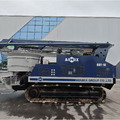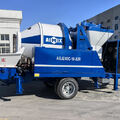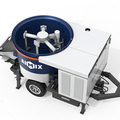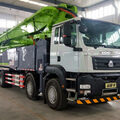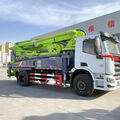When considering the purchase of a mobile concrete pump, one must take into account several factors that influence the overall cost. Among these factors, taxes play a significant role in determining the final price, particularly in countries like the Philippines, where tax policies can directly affect the cost of imported goods and machinery. This article aims to explore the ways in which tax policies impact the price of mobile concrete pumps, also known as pumpcretes, in the Philippines, and how these policies can influence both consumers and suppliers.
Understanding the Mobile Concrete Pump Market in the Philippines
Before diving into the effects of taxes, it’s important to understand the landscape of the mobile concrete pump market in the Philippines. A mobile concrete pump is a type of machinery used to transport and pump concrete to areas that are difficult to access, especially in construction projects such as high-rise buildings, roads, bridges, and other infrastructure developments. These pumps are widely used due to their efficiency and versatility.
In the Philippines, as the demand for construction and infrastructure development grows, so does the need for mobile concrete pumps. Consequently, both local and international suppliers are increasingly involved in the market. However, the prices of these pumps can vary greatly depending on several influencing factors, with taxes being one of the most significant.
Types of Taxes Impacting Mobile Concrete Pump Prices
There are several taxes in the Philippines that can directly affect the cost of mobile concrete pumps. These taxes can either be imposed on the product itself or on the company importing or selling the product. Below are the primary taxes that influence the price of mobile pumpcrete price Philippines:
1. Value-Added Tax (VAT)
VAT is one of the most direct forms of taxation that affects the price of most products and services in the Philippines, including mobile concrete pumps. The VAT rate in the Philippines is typically 12%, and it is added to the sale price of goods and services. When purchasing a mobile concrete pump, the VAT is included in the total cost, which increases the final price the consumer has to pay.
Example: If a mobile concrete pump costs PHP 5,000,000, the VAT would amount to PHP 600,000, making the total price PHP 5,600,000.
2. Import Duties
As many mobile concrete pumps are imported into the Philippines from foreign countries, import duties can significantly increase the cost. The import duty is a percentage of the value of the goods being brought into the country, and it varies depending on the classification of the product. For heavy machinery like mobile concrete pumps, the import duty could be as high as 7% to 15%, depending on the classification under the Harmonized System (HS) Code.
Example: If a mobile concrete pump has a CIF (Cost, Insurance, and Freight) value of PHP 5,000,000, and the import duty rate is 10%, the import duty would be PHP 500,000. This amount is added to the price of the pump, thereby increasing the overall cost for consumers.
3. Excise Taxes
Although excise taxes typically apply to products like alcohol, tobacco, and vehicles, some categories of construction machinery may also be subject to excise taxes. This type of tax can directly add to the cost of the mobile concrete pump, depending on its specifications and the local laws.
Example: If the government imposes an excise tax of 2% on construction machinery, this would add another PHP 100,000 to the cost of a PHP 5,000,000 pump, further increasing the price for the end consumer.
4. Local Government Taxes and Fees
Aside from national taxes, local government units (LGUs) in the Philippines can impose additional taxes and fees. These taxes are typically collected by the local government in areas where the pump is being sold or used. Depending on the region, the local taxes can include business permits, environmental fees, and other charges that could indirectly affect the price of mobile concrete pumps.
Example: In cities with high business activity or construction demand, the LGU may impose additional fees on businesses selling construction machinery. These fees are often passed down to consumers in the form of higher prices for products like mobile concrete pumps.
How Taxes Affect Mobile Concrete Pump Pricing
The combination of VAT, import duties, excise taxes, and local taxes all contribute to the final price of a mobile concrete pump. These taxes can either be absorbed by the supplier or passed on to the consumer. The impact of taxes on the price of mobile concrete pumps can be understood in several ways:
1. Increased Purchase Price
The most immediate impact of taxes on the price of a mobile concrete pump is the increase in the overall purchase price. As mentioned earlier, VAT alone can increase the price of a concrete pump by 12%. When combined with import duties and excise taxes, the price of the pump can rise significantly, which might deter some potential buyers, especially in small-scale construction projects.
2. Higher Operating Costs
For contractors and construction companies, the purchase of a mobile concrete pump represents a significant capital investment. The addition of taxes to the cost of the pump makes it more expensive to acquire. Higher upfront costs may lead to higher financing costs or the need to adjust the budget for equipment, which in turn can raise operating costs.
3. Impact on Profit Margins
Suppliers and distributors of mobile concrete pumps also feel the impact of taxes. If the taxes are significant, they may have to increase their prices to maintain profitability. For companies relying on sales volume to sustain their business, this could result in lower demand if consumers are unwilling to pay the higher price.
4. Incentives and Subsidies
On the other hand, certain government incentives or subsidies can help reduce the impact of taxes on mobile concrete pump prices. For example, the Philippine government has programs that promote the use of eco-friendly equipment, which may result in reduced tax rates or exemptions for certain types of machinery. Suppliers should stay informed about these potential benefits and pass the savings on to customers.
How Can Buyers Mitigate the Impact of Taxes?
While taxes may increase the price of mobile concrete pumps, there are strategies that buyers can use to mitigate the impact:
1. Shop Around for the Best Price
It is important for buyers to compare prices from different suppliers, taking into account not just the purchase price but also the taxes involved. Some suppliers may offer more favorable tax rates or have more efficient shipping methods, which can help lower the overall cost.
2. Negotiate Tax-Related Discounts
Buyers can also negotiate with suppliers to reduce the impact of taxes. For instance, a supplier might be willing to offer discounts to bulk buyers, or they may be able to assist with tax documentation to reduce import duties.
3. Look for Tax Incentives
Buyers should investigate any available tax incentives for purchasing machinery. For example, some government programs might offer tax reductions for specific types of construction equipment or eco-friendly models.
Taxes are an important factor in the price of mobile concrete pumps in the Philippines. Value-added taxes, import duties, excise taxes, and local government fees all contribute to the final cost, which can significantly increase the price for both consumers and businesses. However, understanding these tax factors and utilizing strategies such as comparison shopping and negotiating tax-related discounts can help mitigate their impact. As demand for construction projects continues to rise, staying informed about tax policies and regulations will be crucial for buyers and suppliers alike in the mobile concrete pump market in the Philippines.

